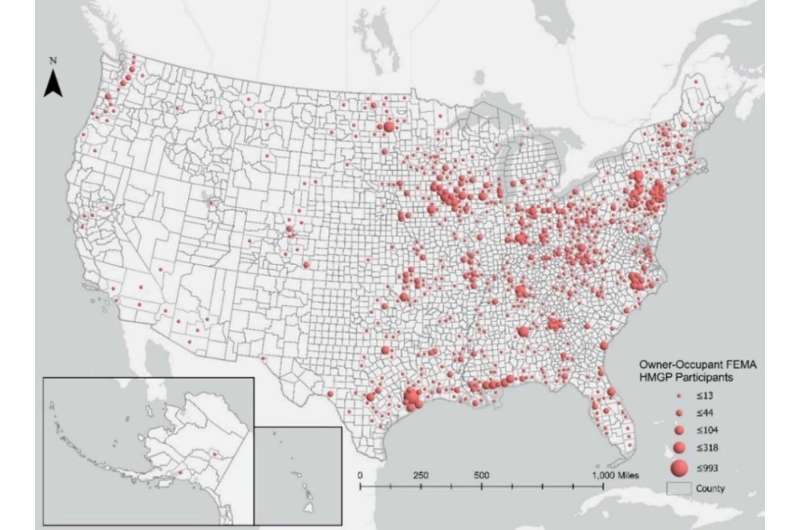White communities prefer to risk repeat flooding rather than move to safer but more diverse neighborhoods

Even after suffering flood damage, homeowners in mostly white communities prefer to accept higher risk of disaster repeating itself than relocate to areas with more racial diversity and less flood risk, according to new research from Rice University.
James Elliott , professor and chair of sociology, and Jay Wang, a senior spatial analyst at Rice’s Kinder Institute for Urban Research, are the authors of “Managed retreat: a nationwide study of the local, racially segmented resettlement of homeowners from rising flood risks,” published today in Environmental Research Letters.
To conduct their research, they tracked where nearly 10,000 Americans sold their flood-prone homes and moved through the Federal Emergency Management Agency’s Hazard Mitigation Grant Program—the largest managed retreat program in the country—between 1990 and 2017. The data included address-to-address residential relocation information, flood risks of different addresses, community-level racial and ethnic composition, average housing values and more.
“We found that across the U.S., the best predictor of the risk level at which homeowners voluntarily retreat is not whether they live in a coastal or inland area, or whether they live in a big city or a small town,” Elliott said. “It is the racial composition of their immediate neighborhood.”
He and Wang found that homeowners in majority-white neighborhoods are willing to endure a 30% higher flood risk before retreating than homeowners in majority-Black neighborhoods, after accounting for the various types of areas people live in (coastal, urban, rural, etc.).
“But, there are also some universal tendencies,” Wang said. “One is that, regardless of location, most retreating homeowners do not move far.”
Nationwide, the average driving distance between people’s bought-out homes and new destinations is just 7.4 miles. Nearly three-quarters—74%—stay within 20 miles of their flood-ravaged homes.
“In other words, homeowners are not migrating long distances to safer towns, states and regions,” Elliott said. “They are moving within their neighborhoods and between nearby areas.”
The research also showed that despite being short-distance, these moves do reduce homeowners’ future flood risks. Nationwide, the average reduction is 63%, from 5.6 on First Street’s flood factor at origin to 2.1 at destination.
“This shows that sustained community attachment and risk reduction can go together,” Wang said. “But, these dynamics remain deeply divided by race, especially for those living in majority-white communities.”
More information:
James R Elliott et al, Managed retreat: a nationwide study of the local, racially segmented resettlement of homeowners from rising flood risks, Environmental Research Letters (2023). DOI: 10.1088/1748-9326/acd654
Citation:
White communities prefer to risk repeat flooding rather than move to safer but more diverse neighborhoods (2023, June 18)
retrieved 18 June 2023
from https://phys.org/news/2023-06-white-communities-safer-diverse-neighborhoods.html
This document is subject to copyright. Apart from any fair dealing for the purpose of private study or research, no
part may be reproduced without the written permission. The content is provided for information purposes only.
For all the latest Science News Click Here
For the latest news and updates, follow us on Google News.

